 A Sojourner: An Ancestral Trait In 2013, Lucio attended a grand Mutia family reunion in Mindanao. This reunion, however, was different. For the first time, my immediate relatives celebrated with the Muslim side of the Mutia clan. According to Lucio, a Christian Mutia relative and a Muslim Mutia relative crossed paths and struck a conversation about how they are connected in the family lineage. This conversation eventually led to the grand reunion. Our Ancestors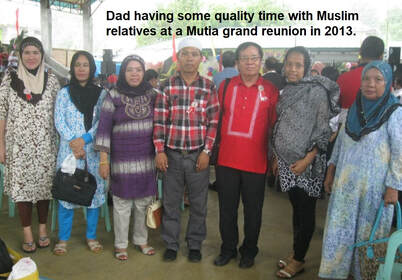 The Muslims of the Mutia family are Maranaos, descendants of Shariff Kabungsuan - the first sultan of the south (Footnote: The Maranao tribe - pejoratively known as “Moros” - are infamously known for their resistance towards Western colonization both by Spain and the United States - hence, they remained Muslim. The United States created the 45 handgun because of their fierce battles with the Maranaos). At this reunion, we learned how the Mutias eventually became Christian. During the Spanish times in the mid 1800’s, one ancestor (my great great grandfather) - fondly nicknamed “Tamak-Tamak” - converted from Islam to become a Christian after marrying a Christian woman. We learned that he was a merchant and never stayed in one place. He frequently travelled from town to town and travelled back and forth between Mindanao and Bohol. 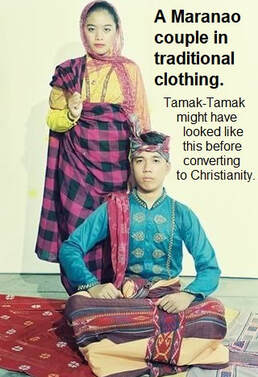 So I asked Dad, “So he seemed unable to put down roots and stay in one place. He was a wanderer. Doesn’t that sound like you?” “You’re right,” he nodded in response. Growing up with Lucio as my dad, I always wondered why he could not stay in one place. Part of this of course had to do with his vocation. Clergy work often involves moving from one church to another. His confused older siblings (farmers deeply rooted to their land) shamed him: “We don’t understand your job - you’re constantly moving and you don’t have your own house. We might not have much, but we have dignity: we have our own house and land.” Dad, however, had no retort - he would just smile quietly. He understood their concern, but unlike his brothers who are anchored to the land, he was a sojourner. He was not phobic to novelty. If a new professional opportunity showed up, he would check it out and give it a try. 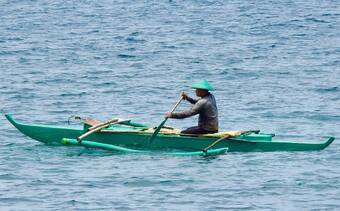 An Ancestral Mythology of the Stormy Seas Some years ago Dad shared an interesting ancestral story about one of Tamak-Tamak’s sons Eugenio (my great grandfather) and Eugenio’s son Francisco (my grandfather). One of Eugenio’s sources of living, on top of farming the land, was as a fisherman. One day Eugenio told his young son to paddle their only bangka (Filipino double-outrigger dugout canoe) into the deep waters because a massive storm was coming. Francisco didn’t have much time to ask why or protest, and simply did what his father commanded. Soon as he was out in deep waters, giant waves came, and my young grandfather carefully rode the bangka on the crests and troughs of the waves.  When the storm ceased, the young Francisco rowed his boat back to the shore only to see all of the bangkas on the shores destroyed by the giant waves that crashed the shores. I think that this story was a significant story for Lucio about his young father. Now and then he would retell this story to me, but I couldn't quiet understand why this story was meaningful to him until after his death. Lucio's Journey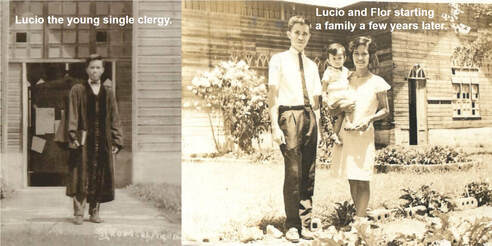 Leaving the Farm to Pursue Education Lucio was born on February 11, 1938 as the youngest of 9 children to a rural farmer and barangay captain (head official of the town) in Bato, Plaridel del Norte in Mindanao. Then at age of 14 young Lucio left the family farm with the adventurous spirit that would characterize his whole life. After quitting a week of work as a kargardor (cargo/baggage handler) at a ship port in Marawi, he found a job as a front desk clerk of a small hotel owned by a well to do Muslim man. This man was enamored by Lucio’s hard work ethic, and subsequently offered to financially sponsor his education and adopt him as his son but with one condition: Lucio must become a Muslim. The generous man even wanted to sponsor his trip to go on a hajj to Mecca. Dad could have easily taken that offer and reclaim back our Muslim ancestry, but he didn’t. Instead, he took an educational opportunity and scholarship at Silliman University’s Divinity school to pursue Christian ministry. 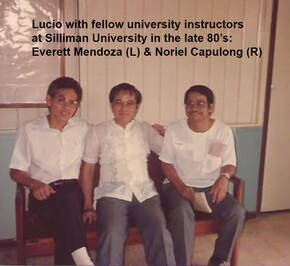 Clergy Work to Full Time Teaching After earning his education at Silliman in the early 60’s he became a young ordained UCCP minister (United Church of Christ in the Philippines) and served churches in Mindanao where he met my mom. In the midst of his church ministry he managed to create space and time to earn a Master of Theology. After his last church ministry in Ozamis City in 1978, he decided to return to Silliman after about 15 years of church ministry to become a full time university instructor at the Philosophy and Religion department. He taught at Silliman for 13 years. This is where I hold most of my childhood memories. During this time, he went to Virginia for a year in 1986 to further his training in Clinical Pastoral Education. 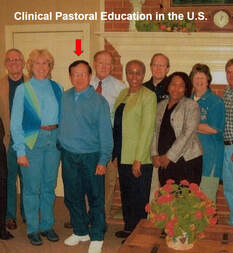 CPE in the U.S. and the Philippines In 1991 he took off once again - this time to take a Clinical Pastoral Education supervisor position at the Medical College of Virginia Hospitals (VCU Hospitals). He also took up church start ministry with the United Church of Christ for the Filipino American community in Richmond, Virginia. Then after 19 years of ministry in the U.S., he decided to return to Silliman to develop a Clinical Pastoral Education program, which is a movement that continues to expand in the Philippines to this day. 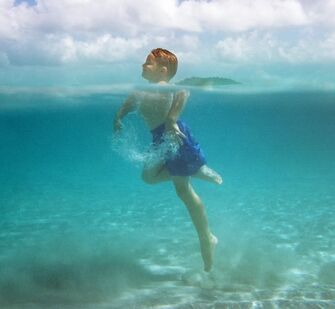 Shallow Faith Versus Deep Faith As a natural homebody, I continued to puzzle over Lucio transplanting multiple times in his life and seemingly unintimidated by new frontiers and new opportunities. He seems to travel through new cultural terrains with a genuine sense of joy and adventure. Then I remembered him preaching a sermon at his church in Richmond Virginia that stuck with me. He said that there are different levels of faith. Imagine faith as a kind of exploration of the sea. There is ankle deep faith. This means that you are taking low risk in venturing the waters, but you still feel secure because you are on shallow water. Then there is knee deep faith. The water now is a bit higher and you might be able to feel the current of the water, but you are still in control. Then there is faith that is at the hip level. Here the ground you are walking on might begin to be blurred by the water, and you feel the currents to be a bit more stronger now. But in general you still feel safe. Then there is chest deep faith - here, your sense of safety has diminished. You start to begin losing your balance as the currents have more power over you. And you may no longer be able to see the ground you are walking on. But God, he said, calls us to true faith, which is to let go of the ground under our feet by swimming into deeper waters. True faith means that you allow the currents of the sea to carry you. You are not in control anymore. 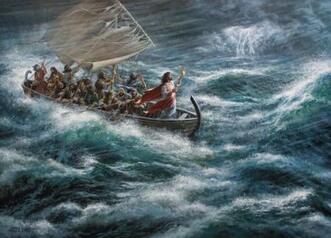 Then I am reminded of the story Lucio shared about his dad, the young Francisco, who had to paddle out to the deep waters so that the giant waves would not crush their family’s bangka on the beach. Going out into the sea is deep faith. Then I am reminded of Jesus, as someone who frequently hung out with fishermen was on a boat - Jesus did not find the depths of the sea intimidating especially during a storm. Jesus calls us to explore, not ankle deep, not chest deep - but out into the deep turbulent waters. 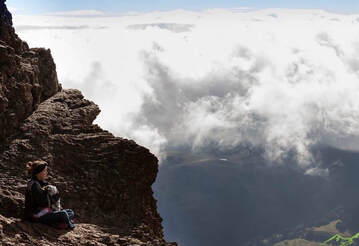 God’s Abiding Presence When Lucio was a clergy for Filipino American churches in Virginia, I remembered that certain biblical texts made him reflect introspectively. Psalm 139 was one of those readings. In deep contemplation, he would often close his eyes, and put his prayer hands in front of his lips. 7 Where shall I go from your Spirit? Or where shall I flee from your presence? 8 If I ascend to heaven, you are there! If I make my bed in Sheol, you are there! I believe that this is the text that gave my Dad ease and a sense of security in his new adventures. We cannot escape God’s abiding presence. God is in the here and now, in each step, in each breath, in each moment. With this knowledge, Lucio was able to venture into the depths of the Sea of Life, and allowed himself to be freely carried by its currents. He explored new territories, not with anxiety, or fear, but with curiosity and wonder. On the Wings of Prayers and Songs
Avoiding retirement upon his return to his homeland in 2010, Lucio worked to develop a Clinical Pastoral Education program in Dumaguete City and beyond, mentoring CPE chaplaincy students and supervising CPE students in supervision track. After ten years of planting the seeds of CPE chaplaincy training programs in the Philippines, Lucio ended on May 2nd the earthly chapter of his life, as he drew his last breath and his spirit embarked on another new adventure, born on the wings of the prayers and songs of the many family members who gathered at his hospital bedside virtually. Lucio’s story of adventure & exploration continues in the stories of the many students he taught, the chaplains and pastors he mentored, the church members he counseled and led, and the family he loved so dearly. His story is now part of our story. May we join Lucio, my dad, our mentor, our teacher, colleague and friend in courageously standing on our faith, as we journey into the deep currents of the Sea of Life. AMEN. Comments are closed.
|
Donnel Miller-MutiaJoin me in chewing the cud on mindful communication and relationships, self-awareness, spirituality and mythology. Archives
May 2024
Categories |
Proudly powered by Weebly
 RSS Feed
RSS Feed
